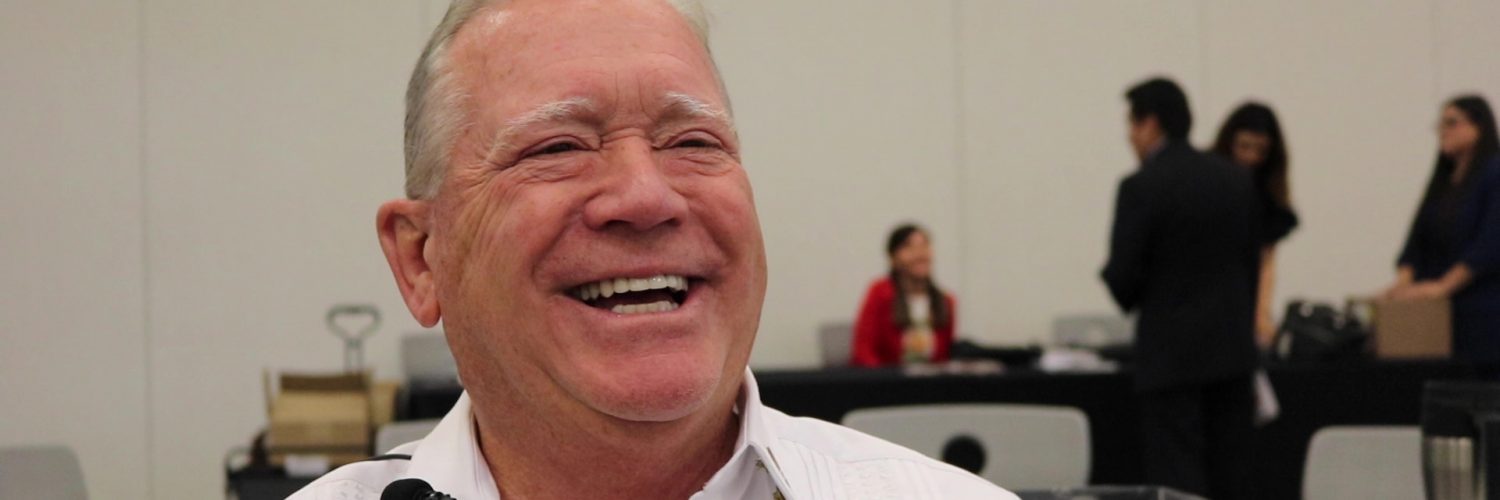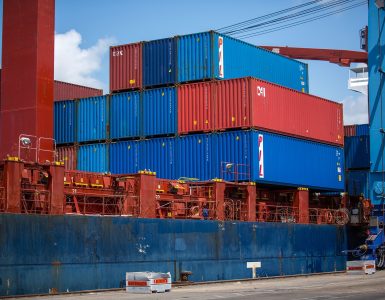Russell Jones, president of R.L. Jones Customs Brokers and member of the Arizona-Mexico Commission’s board of directors, has been involved with the AMC for about 40 years. Jones served as vice chair at one point and assisted with the reorganization of the AMC to make it more business and economic development-focused. He explained that his favorite memories with the AMC are seeing old friends at the plenary sessions and watching the next generation progress.
Question: What is your title?
Answer: I’m president of R.L. Jones Customs Brokers and Trade Forwarders. We’re a third-party logistics services provider internationally and with emphasis- most of our offices are on the southern border. With the AMC, I’ve been on the board of directors now for I think around 40 years. I’ve been a member even a little bit longer.
Q: What is your professional background?
A: I wear some different hats. I served in the State Legislature for a number of years and I was a- goodness gracious, I was appointed to the board of directors for the AMC back by Governor Babbitt. So, that goes back a little ways. Other things I do professionally, I’m very much involved with the Border Trade Alliance. I just finished a two-year term as chairman of the board for the Border Trade Alliance, which is a border-wide grassroots organization supporting and promoting trade and trade facilitation and such. We were active as an organization in the NAFTA and we were active in renegotiations of NAFTA as an organization. We met numerous times with [U.S. Trade Representative] Lighthizer and other folks from both the U.S. and Mexican and Canadian negotiators for that. So, that was fascinating. Also, I’m chairman of the Arizona Power Authority so that gets me back and forth plus being on the board of AMC. So even though I live here in Yuma, I travel back and forth to Phoenix just about every week.
Q: What is your involvement with the Arizona-Mexico Commission?
A: I came in as the vice chairman for AMC under [Governor] Symington when we kind of reorganized the AMC into more of a business and economic development-focused organization. So, that was a dramatic change in the structure and the leadership of the AMC. I came in, I was actually appointed by Governor Jack Williams and then I served in my first meeting under Governor Castro. So, I’ve been there a long time but it was really through Fife Symington when he became governor and he wanted to kind of change the focus of the organization. So, I bought into that and was very active as the vice chairman for a number of years. Some of the things we did back then as vice chairman I reorganized and had joint legislative protocol sessions with the Sonoran Legislature and the Arizona Legislature. The current Speaker of the House Rusty Bowers recalls some of those meetings where we would have joint sessions and meetings, committee hearings. And, we even passed legislation in Arizona that promotes the relationship as a result of that and we were there when they passed legislation at the Sonoran Legislature again promoting the relationship between Arizona and Mexico and Sonora. So, a lot of great history over the years in things we’ve done as an organization that we can do again.
Q: Why do you think the work the Arizona-Mexico Commission does is important for Arizona?
A: I was raised on the border and a good portion of my family are Mexican. Our family moved to the border over 115 years ago and I grew up in a town called Calexico in southern California across from Mexicali. And, understand that the culture- the business culture and the social culture is about relationships and the importance, the value of relationships is much greater. And so, for Arizona to have as robust trading relationship as it has with Sonora and vice versa, you have to have these relationships and that’s what the commission has been about since its inception. It’s about solidifying, continuing the continuity of relationships over the generations between the two states so that we can work better together. That’s why we have a trade office in Hermosillo and they have a trade office at the capital and we exchange business groups on a regular basis and assisting businesses to sell into and deal in Sonora and vice versa. So, again those relationships are key. And, we wouldn’t have those relationships as a state if we didn’t have the commission. It would be more anecdotal- this person has a relationship with that person. As opposed to a state having a close business and personal relationship with another state and its leaders.
Q: How can Arizona and Mexico work together to address issues in the agriculture industry?
A: The agriculture industry is- again this is one where we’re interdependent. It brings jobs to Arizona. A lot of people don’t realize it’s not just Mexican produce coming to the United States because it’s sold here. But, the Mexican produces comes in and mixes with other produce that we grow in Arizona. Like here in Yuma we grow lettuce and cauliflower and broccoli but then we import green onion and turnips and other products from Baja and Sonora. We have newer operations going on down there just recently they have two major companies Church Brothers and we have Taylor Farms. They’re producing complete organic salads that are packaged that have the bacon and the dressing and all that stuff for U.S. markets and worldwide markets. And, they’re using- they work seven days a week, 24 hours a day and they produce and sell to the world from that area and they’re bringing the raw materials in from both sides of the border. Right now, we’re bringing product from Salinas that goes down into Sonora and Baja for process and packaging and they’re mixing it with product in Mexico and even further deeper in Mexico to complete what we’re doing. So, the industry has become so interdependent that it’s- I don’t know how you’d pull them apart because through the port of San Luis, it’s a major export plant for apples and other Pacific Northwest products that go to Mexico. So, it’s huge the business between Arizona and Mexico and it’s dependent. Part of the reason we have that winter produce in the Yuma area is because we have winter produce that mixes with it that comes from Baja, California and Sonora.
Q: In what ways has the Arizona-Mexico Commission successfully worked with bordering communities to address their needs?
A: The commission has been a great venue for bringing in leaders from the different border communities from Nogales and San Luis and Douglas and bringing them to a venue where they have people from Tucson and folks in leadership from the state and from the Phoenix area. They create through our twice-a-year plenaries the opportunity to talk about their issues at the border. Right now, of course in San Luis it’s about infrastructure and here in Yuma it’s about dealing with the refugees or the migrant populations that are impacting the area. And our ability to communicate, have the relationship so we can communicate easily with the governor and others in the state to try to bring resources to address these issues. Again, the commission is an ideal form for these kinds of sensitive international discussions and issues that we’re facing.
Q: Why is it important for Arizona to focus on maintaining and continuously build a relationship with Mexico?
A: If you look at it, obviously Mexico is Arizona’s greatest trading partner, the number of jobs that our trading relationship brings and if we want it, especially with the advent and hopefully we’ll see the ratification of the USMCA and the new opportunities that’s going to provide. Arizona needs to take full advantage of its proximity to Mexico, the fact that we are on a major trade route to and from Mexico, and the interior that goes from the western Canadian provinces down through Arizona and all the way down to Central and to Guadalajara and those other growing areas and manufacturing areas. As those opportunities grow, we’re a hub for that kind of activity. So, we would be foolish not to take advantage of the great relationships we have, use those to leverage additional relationships along the trade corridor and bring jobs and prosperity to our state.
Q: The Arizona-Mexico Commission is celebrating its 60th anniversary. What has been its biggest achievement in the last 60 years?
A: I think its biggest achievement is its longevity and the fact that we’ve been able to do [good work]- didn’t matter whether it was a democrat or republican in our chief administrator positions. Same thing in Mexico. They had different parties come into power. We’ve been able, through the Arizona-Mexico Commission, to maintain this relationship with the business communities continuously for those 60 years in spite of some of the hiccups internationally that go on between the high federal level-the country level- and sometimes at the state. Whether it’s passage of laws in Arizona or at the federal level, we’re able to get beyond that and maintain our trade relationships.
Q: What is your favorite memory with the Arizona-Mexico Commission?
A: I’ve been there so long there are just many of them. But, I think the plenaries and being able to see old friends over the decades that we’ve been there and some of the folks. And now, I think what is a great memory to me is seeing the next generation involved in the AMC and meeting young people who say, ‘Oh yeah, my dad knows you!’ and those kind of things. So yeah, I’ve been there a long time but it’s great to see the continuity and I think that’s the most gratifying thing. I think we’re in great shape and the relationship is strong, if not stronger than it’s ever been thanks to our current governor who’s really done yeoman’s work there in keeping the relationship and growing the relationship. So, I think the next generation is going to do a great job and I’m just looking forward to watching them progress.
















Add comment